#Spain-Gibraltar dispute
Explore tagged Tumblr posts
Text
Euro 2024 Champs in Hot Water: Morata, Rodri's Celebration Chant Sparks UEFA Probe
Spanish football is in hot water after star players Álvaro Morata and Rodri ignited a political firestorm during their Euro 2024 victory celebrations. The celebratory chants, led by the duo, claimed Gibraltar as Spanish territory, a move that has sparked outrage from the British Overseas Territory and landed them in the crosshairs of UEFA, the governing body of European football.Read more....
#Morata UEFA suspension#Rodri UEFA suspension#Euro 2024 Spain celebration#Gibraltar Spain chant#UEFA disciplinary action#Spanish footballers#Gibraltar Football Association#UEFA regulations#National identity in football#Euro 2024 controversy#Spain vs Gibraltar territorial dispute#Nations League suspension#Diplomatic relations Spain UK#Political expression in sports
0 notes
Photo



The Spanish protectorate in Morocco, 1912-1956.
“Breve atlas de historia de España”, Juan Pro, Manuel Rivero Rodríguez, Alianza ed., 1999
“Atlas de Historia de España”, Fernando García de Cortázar, Planeta, 2005
by cartesdhistoire
At the end of the 19th century, France sought colonial rule over the Sultanate of Morocco. In order to avoid conflict with Great Britain, which would not accept France disputing control of the Strait of Gibraltar, France agreed to divide the territory with Spain (1902 agreement). Meanwhile, Germany positioned itself as the Sultan's defender to safeguard its commercial and financial interests. At the Algeciras Conference (1906), Spain expressed interest in dividing Morocco into "zones of influence" and promoted the penetration of its companies in the north. However, this area of Morocco was the poorest, and it was challenging to develop mining businesses there, especially after successive negotiations restricted the Spanish area to the Rif mountain range.
In 1912, Morocco was divided into two protectorates, assigned to Spain and France, as a result of an agreement with Great Britain and Germany. This agreement aimed to save the theoretical independence of the Sultan and exclude Tangier as an international city. However, effectively occupying the Spanish area required a disproportionate military effort. It was a rugged region inhabited by "kabyle" warriors who had already successfully confronted the Spanish army since the Barranco del Lobo disaster in 1909. Under the leadership of Abd-el-Krim, they took up arms against the Spanish penetration, inflicting severe defeats (Annual disaster, 1921). The occupation became a matter of prestige and was only completed under the dictatorship of Primo de Rivera, with the help of France, during the Alhucemas landing in 1925.
Morocco yielded almost no profits but required an occupying army, whose rebellion against the Second Republic helped determine the fate of the Civil War.
Independence was granted in 1956 when France decided to abandon its part of the country.
41 notes
·
View notes
Text
Please reblog for a bigger sample size!
If you have any fun fact about Gibraltar, please tell us and I'll reblog it!
Be respectful in your comments. You can criticize a government without offending its people.
38 notes
·
View notes
Text
Chagos islanders displaced for US military base marched to UK Parliament
Islanders who were forced to abandon their remote Indian Ocean home to make way for a US military base half a century ago protested outside Britain’s Parliament on Monday against a deal they say decided the fate of their homeland without them.
The British government announced last week that it was handing over the Chagos Islands to Mauritius under an agreement that would leave a US naval and bomber base on one of the islands, Diego Garcia.
Located south of the equator off the coast of India, the Chagos Islands have been under British rule since 1814. They became known as the British Indian Ocean Territory in 1965 when they were separated from Mauritius, a British colony that gained independence three years later.
Frankie Bontemps, a second-generation Chagos resident, remarked:
“Today they have a deal that suits them, best of course. But what about the people? What about the people they ignored 65 years ago? I feel, as I do, that history is repeating itself today.”
According to Yasmin Ahmed, director of Human Rights Watch UK, it is crucial for David Lammy, the British Foreign Secretary, Keir Starmer, the Prime Minister, and the whole government to recognise that they will not be able to right historical wrongs or meet their international obligations unless the Chagossian community is at the forefront of any agreements that allow them to return to their homeland and receive compensation.
Way for the US military base Diego Garcia
Britain expelled nearly 2,000 people from the islands in the 1960s and 1970s to make way for the US military base Diego Garcia, which supported military operations from Vietnam to Iraq and Afghanistan. In 2008, the US admitted that the base was also involved in secret rendition flights for terrorist suspects.
A significant number of islanders have resettled in the UK and unsuccessfully tried to reclaim their homeland through British legal channels. Their struggle has received global support, especially from African countries and the United Nations.
In a 2019 advisory opinion, the UN International Court of Justice ruled that Britain illegally partitioned Mauritius when it decided to end colonial rule in the late 1960s. The UN General Assembly has since passed a resolution calling on the UK to end its “colonial administration” of the Chagos Islands and return them to Mauritius.
Britain’s newly-elected Labour government says the military base status could be jeopardised by possible legal disputes if the deal is not finalised.
“British sovereignty over Gibraltar and the Falkland Islands is non-negotiable”
US President Joe Biden has welcomed the deal, saying it “ensures that the joint facility at Diego Garcia will operate effectively for the next century.” But Britain’s Conservative opposition said the decision to hand over part of the territory to the UK sets a worrying precedent for other vast possessions, including Gibraltar, claimed by Spain, and the Falkland Islands, claimed by Argentina.
The government strongly denies this. Starmer spokesman Dave Pares said on Monday that “British sovereignty over Gibraltar and the Falkland Islands is non-negotiable.”
The agreement would create a resettlement fund for displaced Chagos residents aimed at allowing them to return to the islands – with the exception of Diego Garcia. The UK says the details of any return are now the responsibility of Mauritius. Jamie Simon, whose grandparents were expelled from the Chagos islands, said:
“They shouldn’t have done this deal without asking us what we want. It may be just another island to them. It might just be a military base for them..But for us, it’s home.”
Read more HERE

#world news#news#world politics#europe#european news#uk#uk politics#uk news#chagos islands#chagossians#falkland islands#usa#usa news#usa politics#us politics#un#united nations
5 notes
·
View notes
Note
Why the fuck would Gibraltar be given to Morocco just because it was under moorish rule once upon a time. Gibraltar is Gibraltar should not be given to anyone. Also I don’t think it’s fair to compare it to the Turkish player’s gestures. As someone who’s had the displeasure of living in Turkiye I can assure you some Turks can be so racist that it makes western countries seem like a utopia. So let’s not compare!
I’m pointing out the hypocrisy 😭🤣 why should Gibraltar be given back to Spain just bc it was under Spanish rule for a period of time? Etc etc. literally the same logic. it’s all silliness at this point.
And I am in no means denying that the Turkish player did something wrong but again I am calling out a double standard. Spanish players sang imperialist chants (yes it is imperialist) and Serbian fans sang imperialist chants and Turkish players and fans did some racist things etc etc. all are bad. Also acting as if Spaniards are not also racist is crazy. Bc they are.
If England won and started singing abt disputed territories or former colonies I would be disgusted
#asks#lol I have an international relations degree. arguably 2 in fact (one being a graduate degree) 😭🤣#post colonialism is one of my main ‘things’ lol
0 notes
Text
Events 4.25 (before 1940)
404 BC – Admiral Lysander and King Pausanias of Sparta blockade Athens and bring the Peloponnesian War to a successful conclusion. 775 – The Battle of Bagrevand puts an end to an Armenian rebellion against the Abbasid Caliphate. Muslim control over the South Caucasus is solidified and its Islamization begins, while several major Armenian nakharar families lose power and their remnants flee to the Byzantine Empire. 799 – After mistreatment and disfigurement by the citizens of Rome, Pope Leo III flees to the Frankish court of king Charlemagne at Paderborn for protection. 1134 – The name Zagreb was mentioned for the first time in the Felician Charter relating to the establishment of the Zagreb Bishopric around 1094. 1607 – Eighty Years' War: The Dutch fleet destroys the anchored Spanish fleet at Gibraltar. 1644 – Transition from Ming to Qing: The Chongzhen Emperor, the last Emperor of Ming China, commits suicide during a peasant rebellion led by Li Zicheng. 1707 – A coalition of Britain, the Netherlands and Portugal is defeated by a Franco-Spanish army at Almansa (Spain) in the War of the Spanish Succession. 1792 – Highwayman Nicolas J. Pelletier becomes the first person executed by guillotine. 1792 – "La Marseillaise" (the French national anthem) is composed by Claude Joseph Rouget de Lisle. 1808 – Dano-Swedish War of 1808–1809: The Battle of Trangen took place at Trangen in Flisa, Hedemarkens Amt, between Swedish and Norwegian troops. 1829 – Charles Fremantle arrives in HMS Challenger off the coast of modern-day Western Australia prior to declaring the Swan River Colony for the British Empire. 1846 – Thornton Affair: Open conflict begins over the disputed border of Texas, triggering the Mexican–American War. 1849 – The Governor General of Canada, Lord Elgin, signs the Rebellion Losses Bill, outraging Montreal's English population and triggering the Montreal Riots. 1859 – British and French engineers break ground for the Suez Canal. 1862 – American Civil War: Forces under U.S. Admiral David Farragut demand the surrender of the Confederate city of New Orleans, Louisiana. 1864 – American Civil War: In the Battle of Marks' Mills, a force of 8,000 Confederate soldiers attacks 1,800 Union soldiers and a large number of wagon teamsters, killing or wounding 1,500 Union combatants. 1882 – French and Vietnamese troops clashed in Tonkin, when Commandant Henri Rivière seized the citadel of Hanoi with a small force of marine infantry. 1898 – Spanish–American War: The United States Congress declares that a state of war between the U.S. and Spain has existed since April 21, when an American naval blockade of the Spanish colony of Cuba began. 1901 – New York becomes the first U.S. state to require automobile license plates. 1915 – World War I: The Battle of Gallipoli begins: The invasion of the Turkish Gallipoli Peninsula by British, French, Indian, Newfoundland, Australian and New Zealand troops, begins with landings at Anzac Cove and Cape Helles. 1916 – Anzac Day is commemorated for the first time on the first anniversary of the landing at ANZAC Cove. 1920 – At the San Remo conference, the principal Allied Powers of World War I adopt a resolution to determine the allocation of Class "A" League of Nations mandates for administration of the former Ottoman-ruled lands of the Middle East. 1933 – Nazi Germany issues the Law Against Overcrowding in Schools and Universities limiting the number of Jewish students able to attend public schools and universities. 1938 – U.S. Supreme Court delivers its opinion in Erie Railroad Co. v. Tompkins and overturns a century of federal common law.
0 notes
Text
Saturday, April 13, 2024
More than half of foreign-born people in US live in just 4 states and half are naturalized citizens (AP) More than half of the foreign-born population in the United States lives in just four states—California, Texas, Florida and New York—and their numbers grew older and more educated over the past dozen years, according to a new report released Tuesday by the U.S. Census Bureau. In 2022, the foreign-born population was estimated to be 46.2 million people, or almost 14% of the U.S. population. In California, New Jersey, New York and Florida, foreign-born individuals comprised more than 20% of each state’s population. They constituted 1.8% of West Virginia’s population, the smallest rate in the U.S. Half of the foreign-born residents in the U.S. were from Latin America, although their composition has shifted in the past dozen years, with those from Mexico dropping by about 1 million people and those from South America and Central America increasing by 2.1 million people.
One of the world’s highest cities starts rationing water for 9 million people (CNN) There’s a new meme being shared widely this week across social media accounts in Colombia’s capital Bogotá, as the city grapples with a water crisis. It’s an image of C. Montgomery Burns, the supervillain from the animated series “The Simpsons,” showing up at the door with a bunch of red roses and a heart-shaped chocolate box. Smiling, he says: “I saw your turn of water rationing is different from mine.” The meme reflects a sense of dark humor among some Bogotànos following the city authority’s announcement Monday that residents would have to ration water as drought, fueled by El Niño, pushes reservoirs toward record lows. The rationing came into effect Thursday morning. Bogotá and dozens of surrounding towns have been divided into nine different zones with domestic running water cut off for 24 hours in each zone on a rotation that will reset every 10 days. The measures will affect approximately 9 million people.
EU, Britain and Spain to hold more talks on post-Brexit status of Gibraltar (AP) British and Spanish foreign ministers will meet Friday with a top European Commission official for another round of negotiations over the status of the disputed territory of Gibraltar following Britain’s exit from the European Union. Britain left the European Union in 2020 with the relationship between Gibraltar and the bloc unresolved. Talks on a deal to ensure people and goods can keep flowing over the Gibraltar-Spain border have made halting progress during 18 rounds of negotiations. In Britain’s 2016 Brexit referendum, 96% of voters in Gibraltar supported remaining in the EU. The tiny territory on Spain’s southern tip depends greatly on access to the EU market for its 34,000 inhabitants. Gibraltar was ceded to Britain in 1713, but Spain has maintained its sovereignty claim ever since. Relations concerning the Rock, as it is popularly referred to in English, have had their ups and down over the centuries.
Furious European farmers (Washington Post) The farmers standing with their arms crossed outside a sheep barn in rural Brittany were absolutely furious. For a visiting centrist politician, that made for an earful. For Europe’s far right, it has provided an opening. In recent months, angry agricultural workers have rolled their tractors into Paris and other cities across Europe, blocking roads, spraying manure and setting things on fire. Farmers are mad about high costs and low prices, about the prospect of free trade deals, about the constraints of climate regulations, about what they say is a failure of political elites to understand what it means to grow wheat or raise sheep. Their revolt is reshaping European policy—officials who previously promised to put the environment first and lead the world in a green transition have scrambled to walk back some of their own rules. And the farmer uprising may foretell a sharp right shift. The European far right is skillfully seizing the moment, promising an agricultural overhaul and a chance to stick it to the city slickers.
Ukrainian amputees returning to the front to resist Russian advance (Reuters) Ukrainian commander Odin’s lower leg was blown off in a mine explosion last year. Now he’s back in the trenches. Mango, a 28-year-old tank gunner, saw his hand shredded by shrapnel two years ago during fighting in Mariupol before he was captured by the Russians. He too has returned to the front, as logistics chief for a battalion in the Azov Brigade, which held out for months in defence of the southern city. The two soldiers are among thousands of Ukrainian troops who have lost limbs since Russia launched a full-scale invasion in early 2022. While the Kyiv government declined to share data on casualties, which it deems sensitive, Pryncyp, a leading human rights organisation representing military personnel, put the number of amputees from the war at between 20,000 and 50,000. Reuters interviewed 20 military amputees for this article, seven of whom had returned to the army or intended to do so. For many of those able to do so, the desire to support their beleaguered comrades on the battlefield remains strong.
Millions in Myanmar face economic ‘free fall’ due to war, U.N. finds (Washington Post) The civil war now engulfing Myanmar is driving the population into an acute economic crisis, with the middle class shrinking dramatically and poverty spreading widely, according to a report issued Thursday by the United Nations Development Program. U.N. researchers found that the middle class is now half the size it was three years ago and, faced with rising inflation, households are being forced to slash spending on food. Nearly half the population lives under the national poverty line of 76 cents a day. “This was a country that was on a very positive trajectory,” UNDP administrator Achim Steiner said in an interview from New York. Now, Myanmar’s economy is “imploding” and there are no indications this will stop without intervention, he added.
Japan draws closer to the U.S. (Washington Post) In a landmark address to Congress, Japanese Prime Minister Fumio Kishida hailed the United States as an “indispensable” nation. And he voiced sympathy for Americans “who feel the loneliness and exhaustion of being the country that has upheld the international order almost single-handedly” over the past decades. But, Kishida stressed, Japan was ready to share the United States’ burden, and he signaled throughout how Japan was shaking off decades of official pacifism in favor of a more robust security role in Asia. The United States and Japan hammered out dozens of new agreements on defense cooperation. The countries’ militaries will forge a new joint command structure that will better enable them to counter the putative threat posed by China, especially to the self-ruling island of Taiwan. And they will, together with Australia, develop a new Pacific-based air missile defense network. “This is the most significant upgrade in our alliance since it was first established,” said Biden following meetings at the White House on Wednesday.
20 years later, Abu Ghraib detainees get their day in US court (AP) Twenty years ago this month, photos of abused prisoners and smiling U.S. soldiers guarding them at Iraq’s Abu Ghraib prison were released, shocking the world. Now, three survivors of Abu Ghraib will finally get their day in U.S. court against the military contractor they hold responsible for their mistreatment. The trial will be the first time that Abu Ghraib survivors are able to bring their claims of torture to a U.S. jury, said Baher Azmy, a lawyer with the Center for Constitutional Rights representing the plaintiffs. The defendant in the civil suit, CACI, supplied the interrogators who worked at the prison. The plaintiffs seek to hold CACI responsible for setting the conditions that resulted in the torture they endured. There is little dispute that the abuse was horrific. The photos released in 2004 showed naked prisoners stacked into pyramids or dragged by leashes. Some photos had a soldier smiling and giving a thumbs up while posing next to a corpse, or detainees being threatened with dogs, or hooded and attached to electrical wires.
U.S. Sends a Top General to Israel Amid Fears of Iranian Strikes (NYT) The United States dispatched its top military commander for the Middle East to Israel on Thursday, after President Biden stated that, despite recent friction, American support for Israel “is ironclad” in the event of an attack by Iran. Iran’s leaders have repeatedly vowed to punish Israel for an April 1 strike in Syria that killed several senior Iranian commanders. Israel has put its military on alert, and Mr. Biden said on Wednesday that Iran was threatening a “significant” attack. Gen. Michael E. Kurilla, the American commander, will coordinate with Israel on what is widely expected to be imminent retaliatory action by Iran.
Crutches and chocolate croissants: Gaza aid items Israel has rejected (Washington Post) Israel is under growing pressure to ramp up aid to Gaza. In recent days, Israeli authorities say, they have increased the number of food and aid trucks entering the enclave. But relief workers say aid access remains as complicated as ever. In the six months since the start of the war, Israeli authorities have denied or restricted access to items ranging from lifesaving medical supplies to toys to chocolate croissants. Here are some items aid groups said Israeli authorities have blocked from entering Gaza at least once since Oct. 7: anesthetics, animal feed, chocolate croissants, nail clippers, sleeping bags with zippers, stone fruits, surgical tools, toys in wooden boxes, ultrasound equipment, ventilators, water filters and pumps. “I think it’s unprecedented,” Shaina Low, a spokeswoman for the Norwegian Refugee Council in the Palestinian territories, said of the Israeli restrictions. “It’s just nothing that aid agencies have ever had to deal with.”
Sudan’s war began a year ago. Children are among its most fragile survivors (AP) The war in Sudan began a year ago. Here in a remote camp for tens of thousands of people who have fled into neighboring Chad, the anniversary is marked by near starvation. Assadig Abubaker Salih is a 42-year old mother of six. The family survived the hot, dusty journey from their home to this sprawling camp of wind-whipped blue tents stretching in rows toward the horizon. “We are in a very bad situation. We have suffered since we left our country. My husband died,” she said. “There is nothing here. We need the essentials. We don’t even have sugar.” Close to 9 million people have fled their homes, according to the United Nations, and more than 1 million have left the country. Thousands have been killed in a conflict overshadowed by the ones in Gaza and Ukraine. The U.N. says it has asked for $2.7 billion in funding to respond to humanitarian needs but has received $155 million—or 6%. An estimated 3 million Sudanese children are malnourished. About 19 million children are out of school. A quarter of Sudan’s hospitals are no longer functioning.
Some Americans are getting second passports, citing risk of instability (CNBC) Wealthy U.S. families are increasingly applying for second citizenships and national residences as a way to hedge their financial risk, according to a leading law firm. The wealthy are building these “passport portfolios”—collections of second, and even third or fourth, citizenships—in case they need to flee their home country. Henley & Partners, a law firm that specializes in high-net-worth citizenships, said Americans now outnumber every other nationality when it comes to securing alternative residences or added citizenships. According to Henley, the top destinations for supplemental passports among Americans are Portugal, Malta, Greece and Italy. An alternative passport makes travel easier for Americans venturing to parts of the world that are less friendly to the U.S. “For American, British, and Israeli citizens suddenly unsure of their welcome abroad, supplementary passports provide vital flexibility,” according to a Henley report. “With rising global instability, holding citizenship in another country, particularly one that is considered more neutral or politically benign, now provides a valuable back-up or alternative option.
0 notes
Text
Gibraltar and Spain in dispute over sovereignty 'violation'
MADRID — Gibraltar’s top leadership accused Spanish customs agents Friday of “a grave breach of sovereignty and jurisdiction,” alleging they landed on a beach of the British territory while chasing smugglers. The Spanish foreign ministry rejected Gibraltar’s description of events, “as well as the claims of alleged British sovereignty over the territory and waters of Gibraltar contained…
View On WordPress
0 notes
Photo


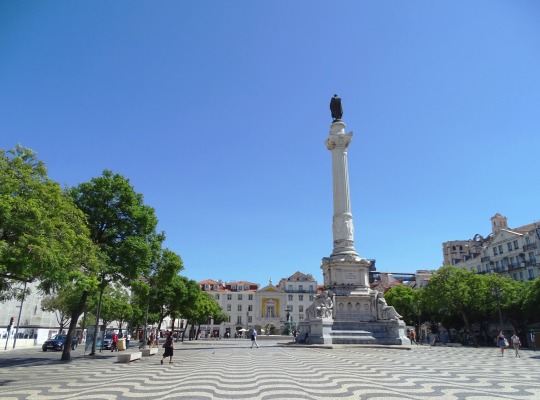
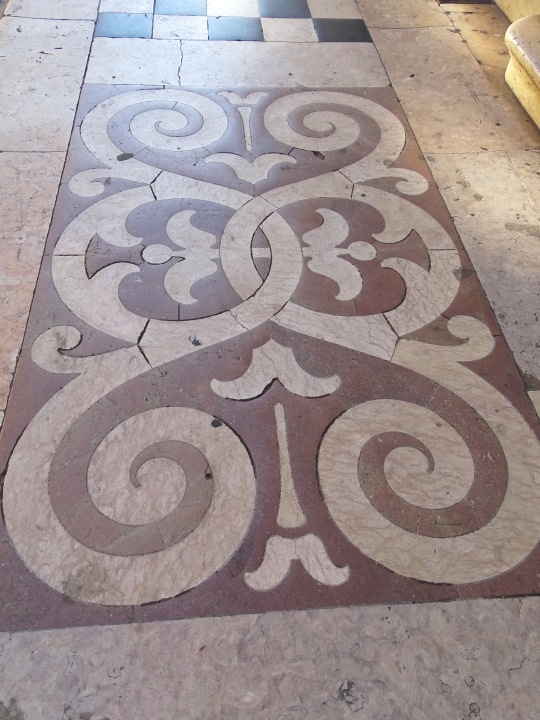
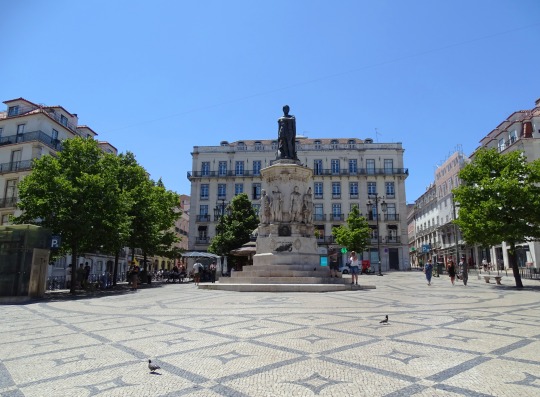
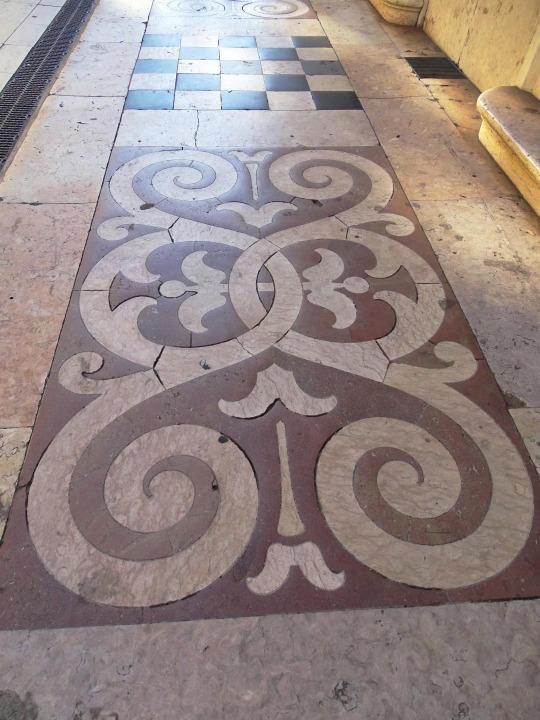

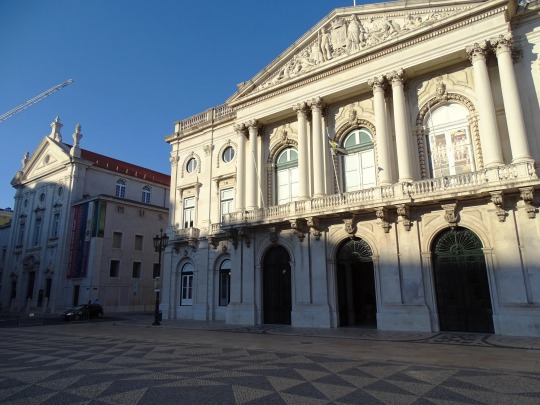
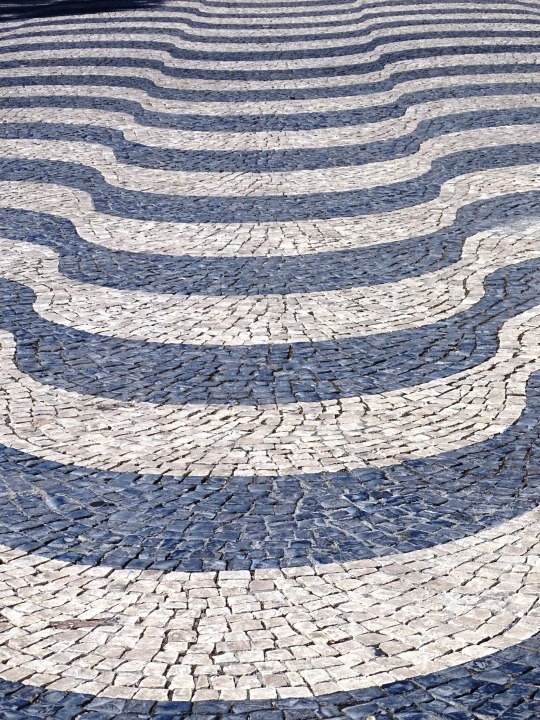
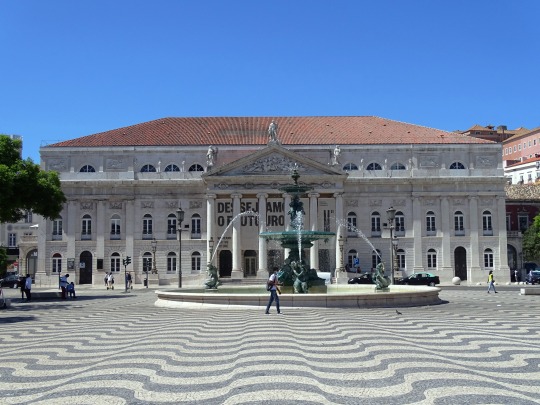
Portuguese Pavement, Lisbon (No. 1)
Portuguese pavement, known in Portuguese as calçada portuguesa or simply calçada is a traditional-style pavement used for many pedestrian areas in Portugal. It consists of small flat pieces of stones arranged in a pattern or image, like a mosaic. It can also be found in Olivença (a disputed territory administered by Spain) and throughout former Portuguese colonies. Portuguese workers are also hired for their skill in creating these pavements in places such as Gibraltar. Being usually used in sidewalks, it is in town squares and atriums that this art finds its deepest expression.
One of the most distinctive uses of this paving technique is the image of Saint-Queen Elizabeth of Portugal, (Santa Rainha Isabel) in Coimbra, designed with black and white stones of basalt and limestone.
Source: Wikipedia
#Portuguese cobblestone#calçada portuguesa#Portuguese Pavement#basalt#limestone#Lisboa#lisbon#architecture#cityscape#Praça Luís de Camões#Portugal#Southern Europe#original photography#summer 2021#vacation#travel#Praça do Município#Rossio Square#King Pedro IV Square#D. Maria II National Theatre
2 notes
·
View notes
Text

Victoria: "Sod off, bloody wanker."
Context:
The Cod Wars (Icelandic: Þorskastríðin; also known as Landhelgisstríðin, lit. 'The Wars for the Territorial Waters') were a series of 20th-century confrontations between the United Kingdom (with aid from West Germany) and Iceland about fishing rights in the North Atlantic. Each of the disputes ended with an Icelandic victory.
The term "cod war" was coined by a British journalist in early September 1958. None of the Cod Wars meet any of the common thresholds for a conventional war, and they may more accurately be described as militarised interstate disputes.
As for the "rock", it's not just a piece of rock, it's the Rock of Gibraltar, and it was the Moors of Tarek ibn Ziyad however that first settled on the Rock in 711AD, and since then, this much-prized site and its people have witnessed many sieges and battles over the centuries.
The position of Gibraltar guarding the entrance to the Mediterranean is unrivalled, and has for many years been fought over by Spain, France and Britain, all claiming possession.
That place has seen lots of sieges during those times.
#planetputo
BLOG: ask-emilz-de-philz.tumblr.com
Please support us @: ko-fi.com/haimacheir
6 notes
·
View notes
Photo
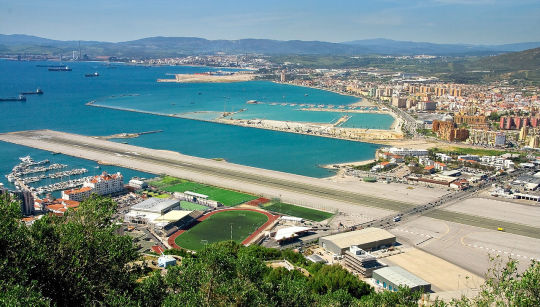
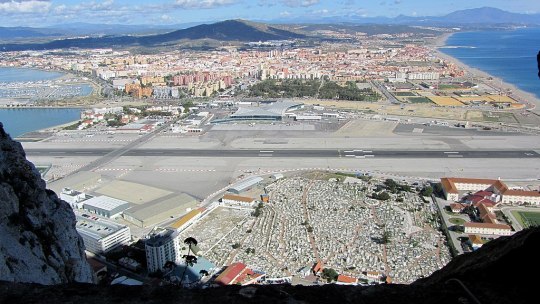
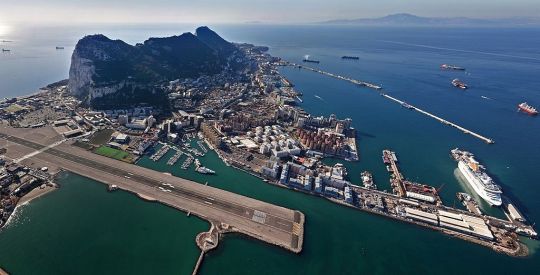
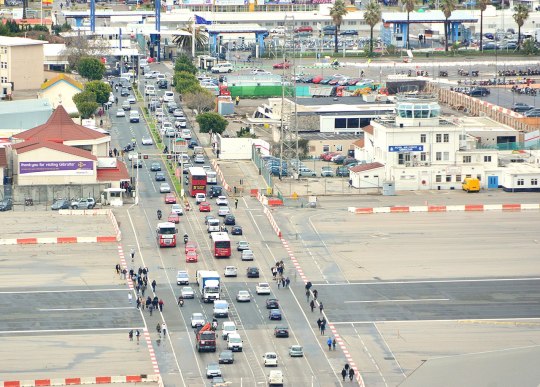
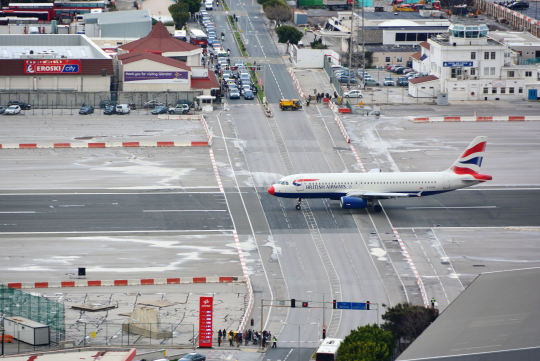

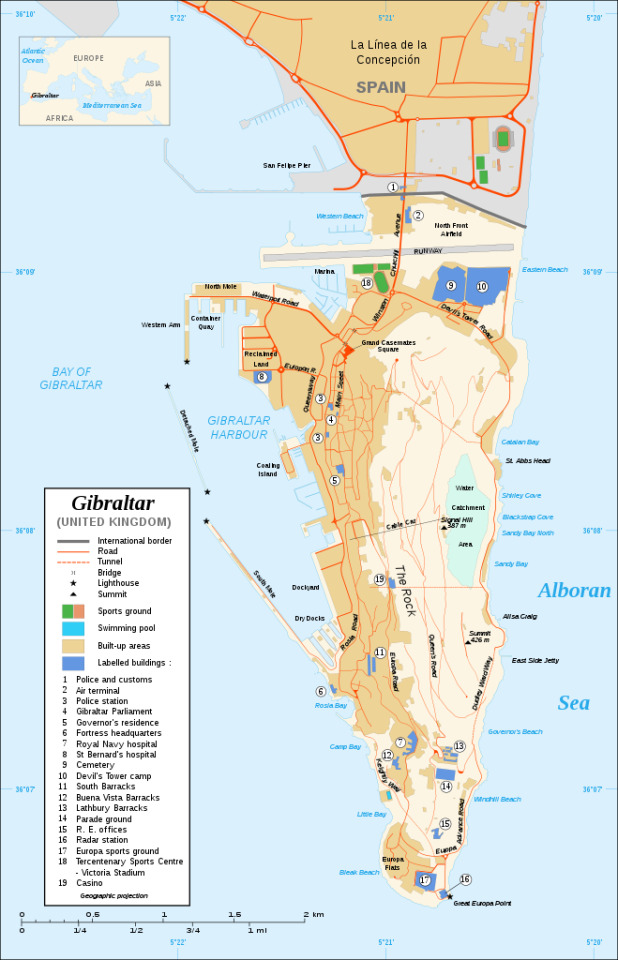
Gibraltar Airport: Where cars have to give way to planes
Other towns have railway crossings, Gibraltar has a runway crossing. The sole runway of the town under British administration crosses the sole road, the 4-lane Winston Churchill Avenue, that connects Gibraltar with Spain. It has to be closed every time a plane lands or takes off, which usually means ten minutes of interrupted traffic, but in some cases can also lead to wait times of up to two hours for cars, pedestrians, cyclists etc. on both sides.
The airport was first created as an emergency landing site for military aircraft, in 1939, and remains under control of the British Ministry of Defense to this day. Due to the small area of Gibraltar, 2.6 square miles or 6.5 km², of which a large amount is taken up by the famous Rock of Gibraltar with Europe’s only wild monkeys, there was no empty space left for an entire runway within city limits, and so it had to intersect with regular street traffic and be built where a horse racing circuit had previously existed. As a result, the airport is one of the few in the world located in walkable distance from a city center, being 500 m or 1640 feet from Gibraltar’s center away. The Spanish town across the border, La Linea de la Concepción is even closer, at a distance of 450 m (1476 ft).
The runway was later extended into the sea using material from the same Rock of Gibraltar and now measures 1,780 m (5,840 ft). A passenger terminal was constructed in 1959, but the airport was cleared for regular civil air traffic only in 1987 following an Airport Agreement between the UK and Spain. Direct connections between Gibraltar and Spain remained prohibited until 2006 with the adopting of a new agreement.
Despite the agreements, the entire airport and the land on which it is located, the 800 m long isthmus connecting the Gibraltar peninsula with Spain, remains subject to a dispute between the UK and Spain, with Spain claiming that it is not part of the town and castle of Gibraltar that was granted to Great Britain following the Treaty of Utrecht from 1713.
This has not stopped the growth of the airport, however, and a new, larger terminal was finished in 2012 to accommodate the increase in starts and landings. Plans for a street tunnel to end the unusual runway crossing also exist, but have not been realized yet.
More information:
Official website of the airport
Chloe Miller: An airport in Gibraltar has a busy 4-lane highway crossing through its runway (Insider.com, May 25, 2016)
Tom Boon: Gibraltar Airport – The Runway With A Road Crossing (Simpleflying.com, June 16, 2020)
Malagaweb.com: Gibraltar airport information
Travelbook.de: Gibraltar hat den wohl absurdesten Airport der Welt (10 September 2017, in German)
Daniel Boffey: EU angers UK with support for Spain's Gibraltar airport claims (The Guardian, 28 February 2019)
SkyVector: Gibraltar Airport
Digital copy of the 1987 Airport Agreement
Image sources:
Topmost image: Andrew Griffith, CC BY 2.0, via Wikimedia Commons
Second image from top: David Jones from Isle of Wight, United Kingdom, CC BY 2.0, via Wikimedia Commons
Third image from top: Ymnes, CC BY-SA 4.0, via Wikimedia Commons
Fourth image from top, traffic running across the runway: Mike McBey, CC BY 2.0, via Wikimedia Commons
Third image from the bottom, street traffic interrupted by a plane on the runway: Mike McBey, CC BY 2.0, via Wikimedia Commons
Second image from the bottom: Royal Air Force official photographer, Public Domain, via Wikimedia Commons
Map: Eric Gaba (Sting), CC BY-SA 4.0, via Wikimedia Commons
3 notes
·
View notes
Text
Lost Kingdom - Re-Review #34

“Lesson over.”
And once again, Kayo is seemingly perfect... @tsarinatorment and @psychoseal is it time for some more rants? I think so. I’m sure Tin-Tin would have been quite capable at holding her own in TOS, and I also think Gordon would be a little better at physical combat. But hey, this is only like forty seconds of the episode, so I will move on.
“I wonder if Kayo’s finally met her match.”
“Guess not.”
Just to say, I was so voting for MAX - seriously, I have faith in this robot. Does no one remember him in ‘Legacy’? I’d have MAX for a guard dog any day.
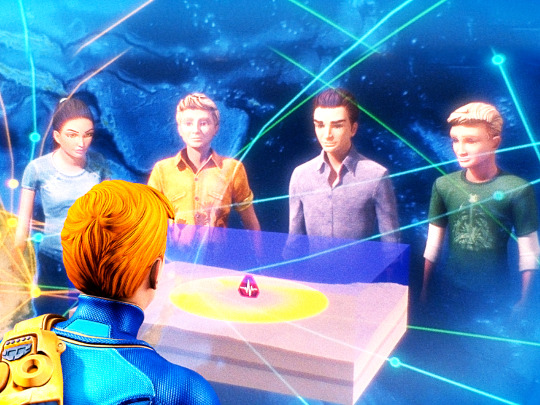
“I’m detecting structures down there. They seem to be man made.”
“Want me to get Virgil?”
Why, Alan? So he can go in and do some heavy lifting? In fairness, there had to be some kind of reference to him because um... where is he? Anyone want to hazard a guess?

“The World Council Emergency conference just ended, and the archaeologists agree, it is the lost city of Atlantis.”
“Imagine that. A city reappearing after thousand and thousands of years.”
“If it’s been buried under water for that long... there won’t be much left that’s worth seeing.”
Oh my gosh, I love the story of Atlantis! Literally, other than animal conservation, Ancient/Classical History was one of my favourite topics.
Anyone else love this film? Apparently it’s one of the most loved Disney films, but also most forgotten. Bit of trivia for you as well - it was the only Disney film to have ten proposed DVD covers, all of which were released as promotional posters, but of course only one made it onto the DVD. However, the German and Chinese distributors for the DVD chose to use different posters for the DVD cover (both of which only saw distribution in these countries) whilst the rest of the world copied the British/American choice. Personally, I preferred every other poster to the one they used the DVD, but hey, they didn’t give me a vote.
And, okay, yes, I won’t admit to knowing everything, but I do know a lot about what other people might class as pointless.
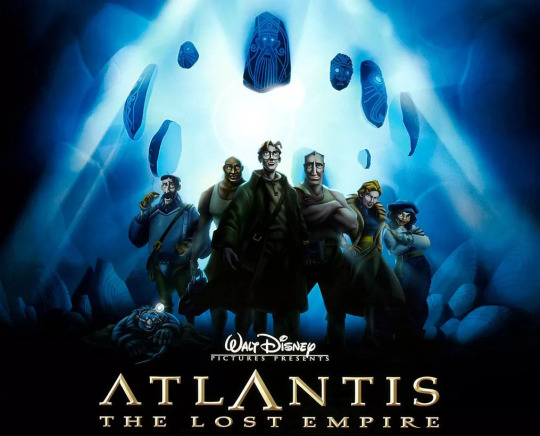
Anyhow, back to Thunderbirds;
“I’ve got a feed coming in. You need to see this.”
“This is Francios Lemaire, bringing you lucky viewers, yet another chance to watch me make history! And here we are, on the bridge-”
“Control room.”
“Control room- of my luxury sub, the Jules Verne, from where I’ll be bringing you footage, of the very first human - that’s me - to explore the legendary, lost city of Atlantis!”
Oh look, here we go!
As soon as that music started I just who it was going to be.
Madeline is perfectly describing my feelings on Francois for this episode in this picture. I think - by the look of the faces we got from Tracy Island - that she describes what the Tracy boys feel as well.

“I order you to leave the area.”
Yeah, Lady Penelope, you tell him.
“Alright, alright, I was only trying to bring a bit of culture to the masses.”
Probably not the right way to do it.
“Your submarine’s in a live sea quake zone, Mr Lemaire, I strongly advise you to leave as fast as you can.”
“What is this? The International Rescue Babysitting Service!”
Um... considering your past record... yes?
Anyone remember the birthday party in the Mariana trench?
“I’m well aware of my location, thank you.”
Um, was he drinking whilst driving? Yeah, that’s a great thing to teach the masses.
“Francois, that’s re... uh.”
“Oh dear. Silly goose. Why didn’t you tell me I was in the wrong gear?”
Probably why you got the wrong gear, mate... Time to call the International Rescue Babysitting Service, d’you think, Lemaire?
So, anyhow, thanks to Lemaire’s stupidity - we have a rescue! And it’s one for Gordon - the water kind of gave that away - and oh look, Virgil (wordlessly) runs across the scene and gets ready to go. Really, where was he?
Still, I think I would have lost my patience with Lemaire by now - and damn ethics, I might have been tempted to ignore him.
“Hello, how much longer do I have to wait?”
“It’s only been half an hour.”
“I’m bored.”
“Patching you through to Thunderbird Two for an update.”
Ha-ha, way to pass Lemaire away from you John!

“We’re coming too!”
I can hardly believe it! It’s Brains, willingly going on a rescue, in person!
“I’ll tell you what’s crazy, Brains. Us chasing Lemaire through an active sea quake zone!”
Why is that man such an idiot? He really didn’t even need IR. Next time definitely just leave him, I vote.
“It’s breathable air.”
“It better be, look!”
And Lemaire’s idiotic streak increases...

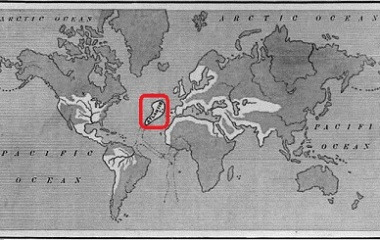
So, here we are - apparently. There are many proposed locations for Atlantis (the first map below is Europe, the second is a wider view of the world), with many still in dispute. For a long time, it was believed that Atlantis being near Santorini made sense. In fairness, when I stayed in Crete, I had a lovely tour with some locals who tried to show me all the reasons why Atlantis had been near them. Actually, their argument (especially in their native language without the typical English mis-translations) is quite convincing. Crete does have massively similar architecture to that suggested in the Ancient Greek depictions of Altantis. It was argued that these could have been built at a much later stage, but the stone dates back far enough to suggest not. Whether or not Atlantis did sit near Crete, it is fair to say (especially as both were inhabited by the Greeks) that maybe the Atlantians did have a part of their Empire there.
Later, theories rose that Atlantis had previously filled a gap in the Straits of Gibraltar, and Island separating Spain and Africa, and potentially offering connections between continents. This was initially met with much annoyance by Greeks, who believed that Atlantis (an ancient Greek Empire) couldn’t have sat so far away from their own homelands. But, at the time, it was really only Greek and Italy who had big plays across Europe, and the Atlantians were rumoured to have waged war or conquered a considerable amount of the country in Greek’s name. The Straits also make a lot of sense scientifically and geographically. Although the Greeks believed (at the time and still now) Poseidon to be responsible for the sinking of Atlantis, we know that it had to have been a combination of earthquakes and/or tsunami’s which brought down this great empire, and the Straits of Gibraltar sit directly on a tectonic fault line which has led to a subduction zone (so sea quakes would be of great possibility - so I’m assuming TAG have gone with Gibraltar as a setting here) which has now been active (that we know of) from the 1700s - seems likely to be it was active before too.
You can read more about that here if it is of interest to you: https://www.livescience.com/19656-gibraltar-subduction-zone.html
Of course, many take the belief that Atlantis was a fictional story of Plato’s, whilst other’s take the belief that it was the end of the ‘last great ice age’ which caused the disappearance of Atlantis (due to flooding, sounding familiar?), but Plato’s descriptions, whether believed or not does suggest that Atlantis built connections between Africa and Europe (later working into the Pangea theories) and that the sea delves further than we know;
“In the Atlantic there was an island, larger than Libya and Asia put together, and was the way to other islands, and from these you might pass to the whole of the opposite continent which surrounded the true ocean; for this sea which is within the Straits of Heracles is only a harbour, and the surrounding land may be most truly called a boundless continent. Now in this island of Atlantis there was a great and wonderful empire which had rule over the whole island and several others, and over parts of the continent. She was pre-eminent in courage and military skill, and was the leader of the Hellenes. And when the rest fell off from her, being compelled to stand alone, after having undergone the very extremity of danger, she defeated and triumphed over the invaders, and preserved from slavery those who were not yet subjugated, and generously liberated all the rest of us who dwell within the pillars. But afterwards there occurred violent earthquakes and floods; and in a single day and night of misfortune all your warlike men in a body sank into the earth, and the island of Atlantis in like manner disappeared in the depths of the sea. For which reason the sea in those parts is impassable and impenetrable; and this was caused by the subsidence of the island. ”
Plato’s final passage on Atlantis, as it sits translated from direct Greek (thus ignore any tense errors - they are intended).
Plato’s impenetrable and impassable ocean theory would fit with the territory of high seismic activity too - which does suggest Gibraltar as a decent proposal, especially as Plato seems to know the Straits by another name, but the same land mass.
Okay, I’ve now ranted on about Ancient history enough, I think (although it is another reason why I love this episode), and I honestly do still have such a soft spot for the history of Atlantis. Maybe one day I’ll change careers and become a historian, but for now I’m happy with my mission of trying to limit extinction and global disasters. If anyone wants any more knowledge on Atlantis, just ask and I’ll put it in a separate post - this one is going to be too long otherwise, and is meant to be about something else.
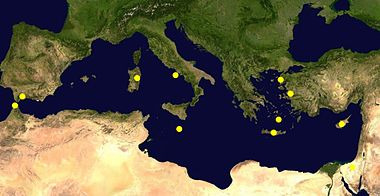
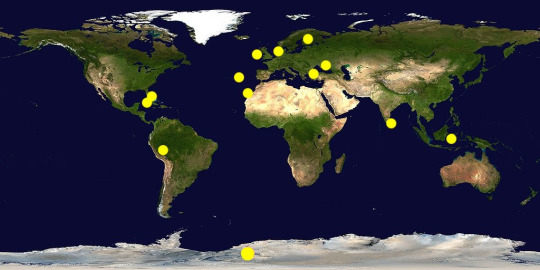
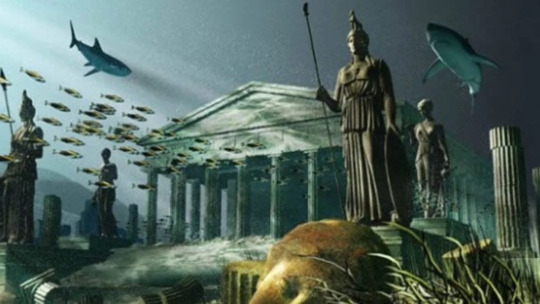
You can definitely see where they took their inspiration from. I seriously adored all the behind the scenes footage for this episode. Go and look at it for yourself, the detail they put into it all makes it worth it.
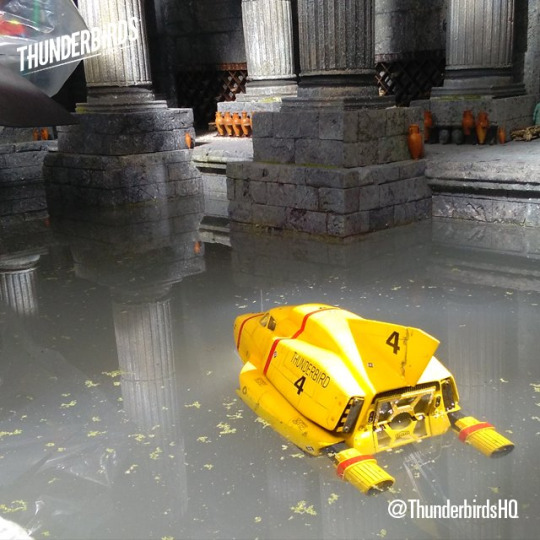
“Look at those shapes. This was definitely built by Mer-people! Start rolling. I’ll do a piece to camera.”
“You grabbed me, we ran. I don’t have the camera with me. And we shouldn’t be in here!”
“Mr Lemaire, you’re putting yourself and your wife in danger!”
Yeah, I don’t think he really cares Gordon, she’s just his glamorous assistant and biographer after all - wife is actually quite far down the list.

“Would you order MAX to assist Mr Lemaire from the area?”
“That won’t be necessary!”
Scared of a robot, are we now, Lemaire?
See, just saying MAX could have totally taken Kayo. In my opinion.
“We’re trapped and Thunderbird Four is on the other side. Is it still in one piece?”
“I’m picking up full readings.”
Hell, it better be! You only just rebuilt it in the last episode! Goodness, imagine that all over again.

“Hello Gordon.”
“Lady Penelope!”
“Aren’t you lucky that I was around to come and dig you out of trouble.”
“I’m even happy to be rescued by a Lady in a pink submarine if it gets me away from Lemaire.”
So don’t go knocking it Gordon! She could easily turn around, you know. And just say you’re happy to see her, Gordon! Goodness these two could have been together long ago if they weren’t both so stubborn (and Gordon a little silly).
“He is one royal pain in the-”
Language! You’re talking to a Lady (and an audience group consisting of children), Gordon! I think we can all agree with the proposed end of that sentence though. Lemaire is.
“Do not fire a missile at my submarine!”
Yeah... point proven, again, I think.
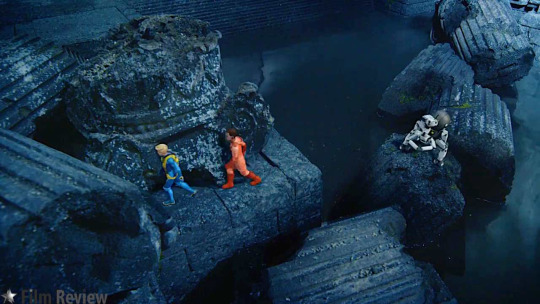
“Final proof that Mer-people exist!”
Did anyone mention yet that meeting a mermaid is Gordon’s dream? Just because, he doesn’t seem too excited about that prospect here. Brains on the other hand, he can die a happy man now.
“We’re going to rebuild it in the assembly hanger, full scale!”

Nice reference to the selfie-stick in this episode, which was at the time, brand new, of course. I am still bitter that said word has made it into the Oxford Dictionary - seriously, they dropped the level of the game by letting that in.
“Parker loves playing pinball, don’t you Parker?”
“Not when hI’m the ball, M’Lady.”
We’re really learning a lot about Parker’s free time lately - pinball and complaining about the weather... hmm, interesting.
It was a nice way to end - showing everyone going out to the pool - good to see them making use of that thing!
#Thunderbirds are go#Lost Kingdom#Re-Review series#Darkestwolfx#John Tracy#Gordon Tracy#Lady Penelope#Parker#Brains#MAX#Francois Lemaire#Atlantis#CITV#ITV#TAG#scott tracy#virgil tracy#Alan Tracy#Kayo#Thunderbird Four#Thunderbird Five#Behind the scenes#lost city#atlantis the lost empire#straits of gibraltar
15 notes
·
View notes
Text
Events 4.25
404 BC – Admiral Lysander and King Pausanias of Sparta blockade Athens and bring the Peloponnesian War to a successful conclusion. 775 – The Battle of Bagrevand puts an end to an Armenian rebellion against the Abbasid Caliphate. Muslim control over the South Caucasus is solidified and its Islamization begins, while several major Armenian nakharar families lose power and their remnants flee to the Byzantine Empire. 799 – After mistreatment and disfigurement by the citizens of Rome, Pope Leo III flees to the Frankish court of king Charlemagne at Paderborn for protection. 1134 – The name Zagreb was mentioned for the first time in the Felician Charter relating to the establishment of the Zagreb Bishopric around 1094. 1607 – Eighty Years' War: The Dutch fleet destroys the anchored Spanish fleet at Gibraltar. 1644 – Transition from Ming to Qing: The Chongzhen Emperor, the last Emperor of Ming China, commits suicide during a peasant rebellion led by Li Zicheng. 1707 – A coalition of Britain, the Netherlands and Portugal is defeated by a Franco-Spanish army at Almansa (Spain) in the War of the Spanish Succession. 1792 – Highwayman Nicolas J. Pelletier becomes the first person executed by guillotine. 1792 – "La Marseillaise" (the French national anthem) is composed by Claude Joseph Rouget de Lisle. 1829 – Charles Fremantle arrives in HMS Challenger off the coast of modern-day Western Australia prior to declaring the Swan River Colony for the British Empire. 1846 – Thornton Affair: Open conflict begins over the disputed border of Texas, triggering the Mexican–American War. 1849 – The Governor General of Canada, Lord Elgin, signs the Rebellion Losses Bill, outraging Montreal's English population and triggering the Montreal Riots. 1859 – British and French engineers break ground for the Suez Canal. 1862 – American Civil War: Forces under U.S. Admiral David Farragut demand the surrender of the Confederate city of New Orleans, Louisiana. 1864 – American Civil War: In the Battle of Marks' Mills, a force of 8,000 Confederate soldiers attacks 1,800 Union soldiers and a large number of wagon teamsters, killing or wounding 1,500 Union combatants. 1882 – French and Vietnamese troops clashed in Tonkin, when Commandant Henri Rivière seized the citadel of Hanoi with a small force of marine infantry. 1898 – Spanish–American War: The United States Congress declares that a state of war between the U.S. and Spain has existed since April 21, when an American naval blockade of the Spanish colony of Cuba began. 1901 – New York becomes the first U.S. state to require automobile license plates. 1915 – World War I: The Battle of Gallipoli begins: The invasion of the Turkish Gallipoli Peninsula by British, French, Indian, Newfoundland, Australian and New Zealand troops, begins with landings at Anzac Cove and Cape Helles. 1916 – Anzac Day is commemorated for the first time on the first anniversary of the landing at ANZAC Cove. 1920 – At the San Remo conference, the principal Allied Powers of World War I adopt a resolution to determine the allocation of Class "A" League of Nations mandates for administration of the former Ottoman-ruled lands of the Middle East. 1938 – U.S. Supreme Court delivers its opinion in Erie Railroad Co. v. Tompkins and overturns a century of federal common law. 1944 – The United Negro College Fund is incorporated. 1945 – Elbe Day: United States and Soviet reconnaissance troops meet in Torgau and Strehla along the River Elbe, cutting the Wehrmacht of Nazi Germany in two. 1945 – Liberation Day (Italy): The National Liberation Committee for Northern Italy calls for a general uprising against the German occupation and the Italian Social Republic. 1945 – United Nations Conference on International Organization: Founding negotiations for the United Nations begin in San Francisco. 1945 – The last German troops retreat from Finland's soil in Lapland, ending the Lapland War. Military acts of Second World War end in Finland. 1951 – Korean War: Assaulting Chinese forces are forced to withdraw after heavy fighting with UN forces, primarily made up of Australian and Canadian troops, at the Battle of Kapyong. 1953 – Francis Crick and James Watson publish "Molecular Structure of Nucleic Acids: A Structure for Deoxyribose Nucleic Acid" describing the double helix structure of DNA. 1954 – The first practical solar cell is publicly demonstrated by Bell Telephone Laboratories. 1959 – The Saint Lawrence Seaway, linking the North American Great Lakes and the Atlantic Ocean, officially opens to shipping. 1960 – The United States Navy submarine USS Triton completes the first submerged circumnavigation of the globe. 1961 – Robert Noyce is granted a patent for an integrated circuit. 1972 – Vietnam War: Nguyen Hue Offensive: The North Vietnamese 320th Division forces 5,000 South Vietnamese troops to retreat and traps about 2,500 others northwest of Kontum. 1974 – Carnation Revolution: A leftist military coup in Portugal overthrows the authoritarian-conservative Estado Novo regime and establishes a democratic government. 1980 – One hundred forty-six people are killed when Dan-Air Flight 1008 crashes near Los Rodeos Airport in Tenerife, Canary Islands. 1981 – More than 100 workers are exposed to radiation during repairs of at the Tsuruga Nuclear Power Plant in Japan. 1982 – Israel completes its withdrawal from the Sinai Peninsula per the Camp David Accords. 1983 – Cold War: American schoolgirl Samantha Smith is invited to visit the Soviet Union by its leader Yuri Andropov after he read her letter in which she expressed fears about nuclear war. 1983 – Pioneer 10 travels beyond Pluto's orbit. 1990 – Violeta Chamorro takes office as the President of Nicaragua, the first woman to hold the position. 2001 – President George W. Bush pledges U.S. military support in the event of a Chinese attack on Taiwan. 2004 – The March for Women's Lives brings between 500,000 and 800,000 protesters, mostly pro-choice, to Washington D.C. to protest the Partial-Birth Abortion Ban Act of 2003, and other restrictions on abortion. 2005 – The final piece of the Obelisk of Axum is returned to Ethiopia after being stolen by the invading Italian army in 1937. 2005 – A seven-car commuter train derails and crashes into an apartment building near Amagasaki Station in Japan, killing 107, including the driver. 2005 – Bulgaria and Romania sign the Treaty of Accession 2005 to join the European Union. 2007 – Boris Yeltsin's funeral: The first to be sanctioned by the Russian Orthodox Church for a head of state since the funeral of Emperor Alexander III in 1894. 2014 – The Flint water crisis begins when officials at Flint, Michigan switch the city's water supply to the Flint River, leading to lead and bacteria contamination upon the citizens. 2015 – Nearly 9,100 are killed after a massive 7.8 magnitude earthquake strikes Nepal.
0 notes
Photo


The island of Menorca is the southernmost place in Europe where gin (the alcoholic beverage) is produced.
Gin is a drink from the British tradition, and so is almost exclusively produced in countries of the English-speaking world.
Why, then, is Menorca an exception? Because Menorca was ruled by Britain for almost a century, from 1713 to 1802.
This happened as a result of the Spanish War of Succession, in which the two independent entities that had the same monarchy fought for who should be the next king. On one side, Castille wanted Philip V of the house of Bourbon, and was helped by its ally France, which was also ruled by Bourbons.
On the other side, the kingdoms that formed the Crown of Aragon (the Kingdom of Mallorca, València, Catalonia, and Aragon itself) refused the Bourbon rule that would make one single dynasty have absolute power over most of Europe, and whose kings were known for their absolutism and centralism. Instead, they proposed as king the Archduke Charles of Austria, brother of the emperror of the Holy Roman Empire, and who had promised to respect each kingdom’s political independence, languages, laws, and traditional institutions.
Historically, the United Kingdom is always ready to fight against France, so they decided to become allies of the Austriacist side. But after some years of war, Charles’ brother suddenly died, and so Charles became emperror. Now that he had more power, he didn’t care about the disputed territories, and abandoned the War. But the people from the Catalano-Aragonese territories knew that losing that war would mean centuries of repression and imposition of Castille (as it finally did: our languages and traditional laws and institutions were banned and we were forced to replace them with the Spanish ones, our territories stopped being ruled by councils and became ruled by an absolute monarchy and Spanish gobernadores chosen by the monarchy, our universities were closed, etc), so they did not stop fighting, even if it meant fighting alone against the some of the most powerful armies in Europe.
The United Kingdom, seeing that this war could not be won, abandoned its allies and signed a treaty with Spain: the Peace of Utrecht, in 1713. As compensation for leaving the war (which meant giving an easy victory to the Bourbonics), the British demanded two strategic territories in the Mediterranean: Gibraltar and Menorca.
The Catalano-Aragonese territories continued to fight alone. Meanwhile, the British occupied Menorca.
The British occupation of Menorca has left many elements that still persist in today’s culture. Gin, which has become a popular drink, is one of them. The British legacy can also be seen the architecture of some buildings around the island (such as the City Hall of Es Castell, in the photo above), or defence structures such as the Marlborough Fort.
Interestingly, English has also left traces in the Catalan language that is spoken in the island. For example, “escrú” means “screw” (instead of standard Catalan “tornavís”), “ull blec” means “black eye” (instead of “ull morat”), or the expression “quatre mens i un boi” (“four men and a boy”, meaning very few people) instead of standard Catalan “quatre homes i un noi”. Another word, which reflects the British domination of the island, is miledi (from “milady”), a word to call a pale woman, usually an English one.
Nevertheless, the British were more permissive than the Spanish, and allowed Menorcans to still speak their language, Catalan, and keep some of their institutions.
#menorca#illes balears#història#gin#llengua catalana#menjar#guerra de successió#history#british history#english history#alcohol#war of the spanish succession#spanish war of succession#cultures#culture#language#languages#langblr#minorca#balearic islands#xoriguer#gibraltar#did you know#did u know
176 notes
·
View notes
Text
Rock Fight
By Ishaan Tharoor, Washington Post, April 4, 2017
Gibraltar, the tiny British-run peninsula near the southern tip of Spain, has ended up at the center of the continental drama over Brexit. A draft outline of the European Union’s negotiating position on the terms of Britain’s departure from the bloc appeared to give Spain final say over whether any deal would apply to Gibraltar. “London will have to negotiate directly with Madrid on any Brexit-related arrangements affecting Gibraltar,” my colleagues explained.
This gives Spain, which resents Britain’s three-century-long occupation of Gibraltar, a powerful bargaining chip--and a potential opportunity to renew calls for joint sovereignty over the territory, which is heavily reliant on access to the Spanish mainland. It also gave a few nationalist Britons cause to grumble and even threaten Madrid with war.
Some 30,000 British citizens live in the shadow of the Rock of Gibraltar, a limestone monolith that owes its name to the Moorish conqueror who made the narrow crossing from North Africa in 711. In last year’s Brexit referendum, Gibraltarians voted almost unanimously to remain in the European Union, largely because they knew any departure from Europe’s common market would wreak untold havoc upon their little community.
The irony is that, virtually from the beginning, Gibraltar was subject to heated European dispute and negotiation. In 1704, an expeditionary force led by the British captured the narrow strip of land by the Rock during the complicated War of the Spanish Succession. That conflict ended in 1713 with a series of peace treaties signed in the Dutch city of Utrecht. One of those documents gave Gibraltar to Britain.
This treaty stated that Gibraltar’s “town, castle and fortifications were to be held and enjoyed forever without any exception or impediment whatsoever.” Given the peninsula’s location, it provided the British with a strategic point from which to control or interfere with sea traffic in the Mediterranean. Almost immediately, challenges to British control emerged. The Dutch, whose troops had taken part in the 1704 invasion, had their own claims subdued by British diplomats. Spain attempted to retake the territory at various points in the 18th century.
In 1727, a Spanish force laid siege to Gibraltar by land and sea and conducted a series of heavy bombardments. The British garrison withstood the attack, while the Spanish guns began to malfunction and explode. The British would reject various Spanish requests to give up the territory. In 1778, as Spain contemplated entering the American War of Independence along with the French, Madrid made yet another failed overture. The First Count of Floridablanca, the chief minister in the Spanish court, was said to have grumbled about “this pile of rocks called Gibraltar, which gives nothing except worries and expenses, troubles us and prevents our permanent friendship.”
Nevertheless, Gibraltar hosted what was perhaps the largest and most drawn out military engagement of the American War of Independence--no matter that it took place an ocean away. A combined French and Spanish force launched a prolonged assault on “this pile of rocks” from 1779 to 1783, the longest siege ever endured by British troops. Constant Spanish cannonade from land and sea laid waste to much of the town by the seaside, but failed to dislodge the British batteries up on the cliff. British troops used a network of tunnels to aim their guns from a steep angle directly at the ships below. (The tunnels proved a strategic asset as late as World War II.)
On Sept. 13, 1782, the French and Spanish had massed about 35,000 troops around Gibraltar. They unleashed a blistering bombardment from batteries both on land and floating close to the shore, launching about 40,000 artillery shells. About 80,000 Spaniards gathered in the surrounding hills to watch the awesome show.
The attack, known as the “Grand Assault,” failed. Gibraltar remained in British hands.
The 19th century saw the demise of Spain as an imperial power and the rise of Britain as a dominant global player. There was little question of Gibraltar’s status as a key British naval base. But the dispute flared again under Spain’s 20th-century fascist leader, Gen. Francisco Franco. Franco defied pressure from Nazi Germany to take the peninsula in 1940 and maintained his nation’s technical neutrality, but he sealed Gibraltar’s land borders in 1969.
“Families divided by the separation were forced to shout news of births and deaths across a fence, their words dying in the sea wind on particularly blustery days,” wrote my colleague Griff Witte.
The borders were only fully reopened in 1985, a full decade after Franco’s death and a year before Spain joined what is now the European Union.
British Foreign Office documents from the 1980s revealed how Spanish King Juan Carlos I told British authorities at the time that it was “not in Spain’s interest to recover Gibraltar in the near future.” Doing so would lead to immediate claims from Morocco for the return of Ceuta and Melilla, two small patches of North Africa that remain Spanish territory to this day.
Still, tensions have flared over numerous differences, including spats over fisheries and the presence of British nuclear submarines in Gibraltar’s harbor. The territory, which has become a conspicuous offshore haven for gambling companies and hedge funds, remains steadfastly loyal to Britain. In referendums held in 1967 and 2002, nearly all voters opted to maintain ties to London.
But that devotion will be put to the test by Brexit. About 12,000 workers cross the border every day from neighboring Andalusia; Gibraltar imports almost everything.
Gibraltar’s chief minister, Fabian Picardo, declared to Witte earlier this year that “the people of France are French, the people of Germany are German and the people of Gibraltar are British.” But he added that the vote to leave the European Union was a “deep sorrow” for Gibraltarians, hinting at the difficulties that lie ahead.
0 notes
Text
Fun Fact 362
Since the last World Cup in Brazil in 2014, two new countries have joined FIFA. The disputed Republic of Kosovo, which remains unrecognised by the UN, and Gibraltar, the British island territory found below Spain.
#politics#politics fun facts#fun facts#facts#politics facts#amazing#amazing facts#interesting#interesting facts#did you know#til#today I learnt#world#travel#international#international relations#international politics#uk#united kingdom#britain#gibraltar#soccer#kosovo#UN#United Nations#UNSC#United Nations Security Council#UNGA#United Nations General Assembly#world cup
84 notes
·
View notes